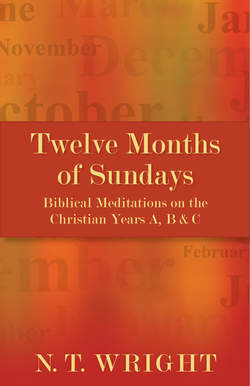Читать книгу Twelve Months of Sundays - N.T. Wright - Страница 22
На сайте Литреса книга снята с продажи.
ОглавлениеProper 1
Isaiah 58.1–12
1 Corinthians 2.1–16
Matthew 5.13–20
Isaiah’s stinging rebuke contains the seeds of the Sermon on the Mount. True piety must be part of the outward movement to share your blessing with the world. Fasting is useless if injustice goes unchecked. Look after the poor, and your light will rise like the dawn. God will be present when you call him.
Jesus’ challenge to be the salt of the earth and the light of the world was not simply an agenda for his followers at the time or the Church of the future. It was a direct Isaianic challenge to the Israel of his day. They were called to be the light of the world. God’s purpose for Israel was that through them he would bring his justice and mercy to bear upon the nations. The city set on a hill, unable to be hidden, is Jerusalem, where the nations would come to learn God’s law.
Yet Israel in Jesus’ day was refusing this vocation. Of course there were many wise and devout Jews; but the nation as a whole, as Josephus records, was bent not on bringing God’s light to the pagan world but on bringing it God’s swift judgement, especially that part of it that was currently ruling the Middle East with casual brutality. Understandable, but unfaithful.
Jesus’ call is far more than a set of abstract moral lessons. It is a summons to Israel to be Israel, while there is still time. This is what the law and the prophets pointed to. And if Jesus’ way meant abandoning some of the interpretations (Pharisaic or whatever) which at the time seemed part and parcel of the law, so be it. The call to the higher righteousness corresponds to Isaiah’s summons to an outward-looking piety in which Israel will at last be God’s people for the world.
In one sense, the call was unsuccessful. Capernaum, Chorazin, Bethsaida – the towns around the Mount – by and large resisted Jesus’ bracing challenge. The early Church took it up again later. But in the meantime it was Jesus himself who followed his own programme. He became salt for the world around. He acted as the light-bringer to the nations. He became, when all others had rejected him, the one set on a hill who could not be hidden, embodying in himself what Jerusalem was meant to be but had not been, drawing all peoples to himself. The sermon was an agenda which Jesus himself carried out.
That is why his death was the defeat of the powers. The rulers of the world wouldn’t have crucified him if they had known what they were accomplishing: they were signing their own death warrant. From now on, true power comes, as Paul discovered, not through the wisdom or force of the world but through the gospel of Christ and him crucified. If the Spirit is at work through this gospel, law and prophets alike will look on and declare that this is what they had in mind all along.
